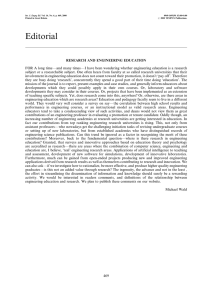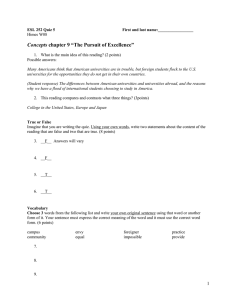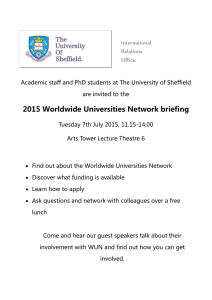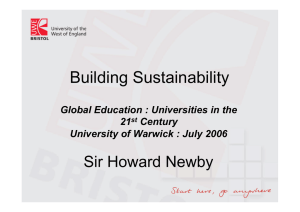Fair Use and the Statutory Licences
advertisement
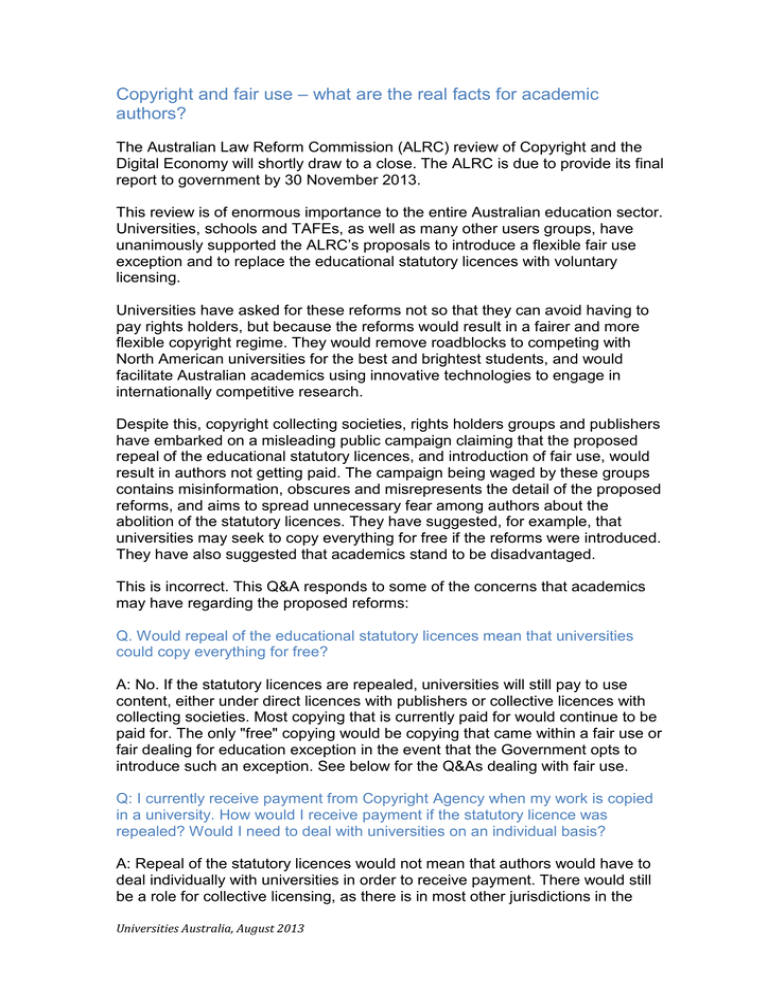
Copyright and fair use – what are the real facts for academic authors? The Australian Law Reform Commission (ALRC) review of Copyright and the Digital Economy will shortly draw to a close. The ALRC is due to provide its final report to government by 30 November 2013. This review is of enormous importance to the entire Australian education sector. Universities, schools and TAFEs, as well as many other users groups, have unanimously supported the ALRC’s proposals to introduce a flexible fair use exception and to replace the educational statutory licences with voluntary licensing. Universities have asked for these reforms not so that they can avoid having to pay rights holders, but because the reforms would result in a fairer and more flexible copyright regime. They would remove roadblocks to competing with North American universities for the best and brightest students, and would facilitate Australian academics using innovative technologies to engage in internationally competitive research. Despite this, copyright collecting societies, rights holders groups and publishers have embarked on a misleading public campaign claiming that the proposed repeal of the educational statutory licences, and introduction of fair use, would result in authors not getting paid. The campaign being waged by these groups contains misinformation, obscures and misrepresents the detail of the proposed reforms, and aims to spread unnecessary fear among authors about the abolition of the statutory licences. They have suggested, for example, that universities may seek to copy everything for free if the reforms were introduced. They have also suggested that academics stand to be disadvantaged. This is incorrect. This Q&A responds to some of the concerns that academics may have regarding the proposed reforms: Q. Would repeal of the educational statutory licences mean that universities could copy everything for free? A: No. If the statutory licences are repealed, universities will still pay to use content, either under direct licences with publishers or collective licences with collecting societies. Most copying that is currently paid for would continue to be paid for. The only "free" copying would be copying that came within a fair use or fair dealing for education exception in the event that the Government opts to introduce such an exception. See below for the Q&As dealing with fair use. Q: I currently receive payment from Copyright Agency when my work is copied in a university. How would I receive payment if the statutory licence was repealed? Would I need to deal with universities on an individual basis? A: Repeal of the statutory licences would not mean that authors would have to deal individually with universities in order to receive payment. There would still be a role for collective licensing, as there is in most other jurisdictions in the Universities Australia, August 2013 world. Authors would continue to be represented by a collecting society such as Copyright Agency and receive payment through them when their works were used by universities in ways covered by the licence. Q: If fair use is introduced, won’t universities be able to copy some things for free that they currently pay for? A: It is likely that fair use would allow universities to use small amounts of copyright works that currently attract payment under the statutory licences. This would put Australian universities in the same position as universities in the USA, Canada, Singapore, and other fair use jurisdictions, who can copy for educational purposes in ways that are "fair" and do not cause undue harm to rights holders. Currently, Australian universities are at a comparative disadvantage to these other jurisdictions. Q. What else would fair use allow me to do? A: Fair use would enable Australian academics to use copyright content in ways that their peers in the US and other fair use jurisdictions can. This includes using innovative technologies such as data mining and text mining that in many cases would currently infringe copyright in Australia. Fair use would also facilitate academic engagement by permitting Australian academics and their students to incorporate small parts of copyright works into academic papers, theses etc, that are shared with peers. Q. I’m about to teach a MOOC. How would fair use help me? A: Currently, there is no exception that permits an Australian university to use third party content in a MOOC. In the USA, on the other hand, academics are exploring the ways in which fair use can be relied on to incorporate small amounts of text and audio-visual content in MOOCs. A fair use exception would put you in the same position as your peers in the USA and other fair use jurisdictions. The UA submissions to the review can be found here (or see link below). They explain the benefits of moving to voluntary collective copyright licensing and why a flexible fair use regime is important for the education sector. They give many practical examples of how the current system is no longer working and the benefits of fair use. _________________________________ LINKS ALRC Review: http://www.alrc.gov.au/inquiries/copyright-and-digital-economy UA information and submissions: http://www.universitiesaustralia.edu.au/page/856/submissions---reports/reviews-andinquiries/2013-submissions/inquiry-into-copyright-and-the-digital-economy/ Universities Australia, August 2013
